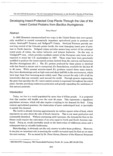Developing Insect-Protected Crop Plants Through the Use of the Insect Control Proteins from Bacillus thuringiensis
JIRCAS international symposium series
| ISSN | 13406108 |
|---|---|
| 書誌レコードID(総合目録DB) | AA1100908X |

本文フルテキスト
intlsymp-5_211-216.pdf230.04 KB
In 1996 Monsanto commercialized two crops in the United States that were genetically modified to control economically important agricultural pests in potatoes and cotton, NewLeafTM Potatoes and BollgardTM Cotton. NewLeaf Potatoes provide season-long control of the Colorado potato beetle, the most damaging insect pest of potatoes in North America. Bollgard cotton provides season-long control of the principal insect pests of cotton, the cotton bollworm and tobacco budworm. On the way, is
YieldgardTM corn , which provides excellent control of the European corn borer and is expected to reach the U.S. marketplace in 1997. These crops have been genetically modified to produce the insect control protein derived from the common soil bacterium Bacillus thuringiensis (B.t. ). The B.t. protein produced by these plants is identical with that found in nature and in commercial B.t. formulations, available for the last 30 to 40 years. While present microbe-based B.t. products control these same insects, they have shortcomings such as high costs and short half-life in the environment, which have kept them from becoming more widely used. They account for only 1-2% of all the insecticides that are currently used around the world. Through genetic engineering, the gene that specifies the B.t. insect control protein is expressed throughout the entire plant, thereby providing continuous protection and greatly expanding the usefulness of this natural pesticide.
YieldgardTM corn , which provides excellent control of the European corn borer and is expected to reach the U.S. marketplace in 1997. These crops have been genetically modified to produce the insect control protein derived from the common soil bacterium Bacillus thuringiensis (B.t. ). The B.t. protein produced by these plants is identical with that found in nature and in commercial B.t. formulations, available for the last 30 to 40 years. While present microbe-based B.t. products control these same insects, they have shortcomings such as high costs and short half-life in the environment, which have kept them from becoming more widely used. They account for only 1-2% of all the insecticides that are currently used around the world. Through genetic engineering, the gene that specifies the B.t. insect control protein is expressed throughout the entire plant, thereby providing continuous protection and greatly expanding the usefulness of this natural pesticide.
| 作成者 | Terry Stone |
|---|---|
| 公開者 | Japan International Research Center for Agricultural Sciences |
| オンライン掲載日 | |
| 号 | 5 |
| 開始ページ | 211 |
| 終了ページ | 216 |
| 言語 | eng |
